Relief in Scampton as RAF site asylum plan ditched
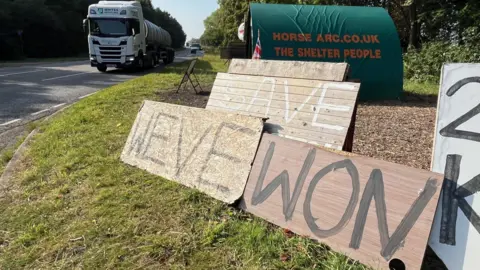 Kevin Shoesmith/BBC
Kevin Shoesmith/BBCOn Thursday, the government announced the former RAF Scampton airbase in Lincolnshire would now not be used to house asylum seekers. BBC News went along to gauge reaction among local villagers.
Brown conifer branches slung across pallets to make barricades in front of RAF Scampton, the former home of the Dambusters, give a sense of the longevity of this protest.
Today, the protesters' camp is empty, with only a few, unused Union flag paper plates and a shopping list of essentials scribbled on a whiteboard showing people lived here.
Before leaving, they painted a final goodbye message on scraps of wood: "We've won".
Residents say they want the former base to be turned into a tourist attraction honouring the men of 617 Squadron who took off from Scampton to attack German dams in World War Two.
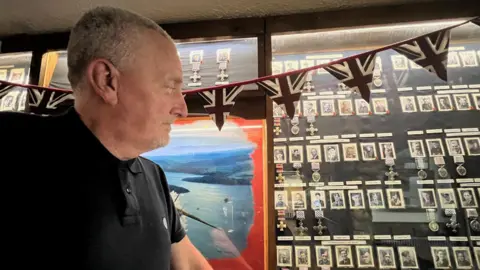 Kevin Shoesmith/BBC
Kevin Shoesmith/BBCA short drive away in the village of Scampton itself, residents are still rejoicing.
Save Our Scampton signs greet patrons entering The Dambusters Inn; a pub packed with memorabilia relating to the famous 1943 raids.
"See all those faces, with poppies on them?" asks landlord Steve Plews, pointing to the left-hand side of a wall displaying eight rows of photographs of men in RAF uniform.
"All those men never returned. When you see their faces, it hits you."
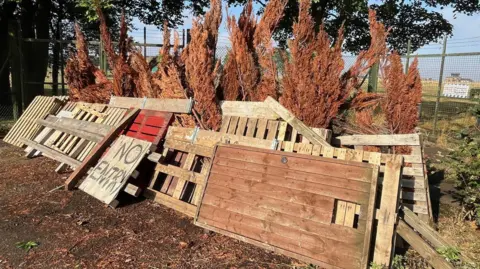 Kevin Shoesmith/BBC
Kevin Shoesmith/BBCOn the right-hand side of the wall are the photographs of the crew who returned safely.
"But those who have a poppy on their photo did not survive the remainder of the war," says Mr Plews.
His comments show how intertwined opposition to the Home Office plans for RAF Scampton was with this community's proud links to 617 Squadron, known as the Dambusters.
"Everyone has played their part in this victory against the government," says Mr Plews, turning to face the men on the wall. "Just as these men played their part in saving our country in 1943."
He unfurls a long banner, conveying the same message, which, until recently, was fixed to the front of the pub.
"One customer was in tears last night when the announcement was made. They were just completely overwhelmed."
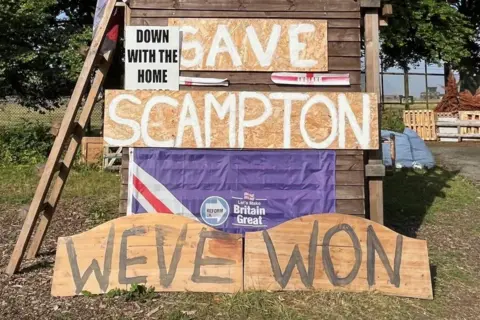 Kevin Shoesmith/BBC
Kevin Shoesmith/BBCOn my way out, Mr Plews shows me a side room.
"This was the village post office in World War Two," he says. "The crews' post would have come through here."
Chris Ward, from a local brewery, is delivering kegs of ale.
"There is such a rich history here in Scampton," he says, glancing at medals earned by the airmen. "To have disregarded that by building an asylum camp at the base would have been a disaster.
"It would also not have been safe to house asylum seekers there. You can see just from looking at the things in this pub what RAF Scampton means to people here."
 Kevin Shoesmith/BBC
Kevin Shoesmith/BBC Relief is the overwhelming emotion felt by Cassie Holborow, 31, who, in light of the about-turn, now intends to buy a home in Scampton with her husband and their three children.
"We feel reassured," she says, having just dropped her children off at Scampton C of E Primary School. "Scampton is a lovely little village but we didn't want to buy a house while there were still plans for the immigration camp. It has caused quite a bit of worry."
Ms Holborow's husband serves with the RAF and they currently live near the air station.
She hopes plans to preserve the wartime heritage of Scampton can be quickly resurrected.
"It's really important," says Ms Holborow. "There are fourth generation Scampton kids in that school. It's a tight community."
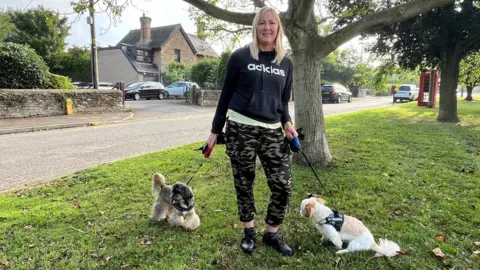 Kevin Shoesmith/BBC
Kevin Shoesmith/BBCFurther down the street I spot professional dog walker Simone Hunt, and ask her if the pushback was borne from a genuine desire to preserve history or mistrust of asylum seekers.
"It's not racist at all," she tells me. "It's about keeping our community safe. Some of these people will not have arrived in the UK with passports. How will anyone have known their backgrounds?
"That road, next to RAF Scampton, is extremely busy. There is no pavement. There will have been accidents. It just wasn't the right place."
Everywhere in the village there are reminders of the Dambusters. A silhouette of a Lancaster - the type flown by Wg Cdr Guy Gibson's men - welcomes visitors to 617 Court, a housing estate.
Here, joiner Andy World, 45, and roofer James Wilson, 56, are carrying out repairs to a property.
"I think it's great news," says Mr Wilson, reacting to the government's decision. "A lot of our heritage would have gone to rot and ruin had they [asylum seekers] come here.
"That wartime heritage would have meant nothing to them, but it does to people living here."
Mr World adds: "Campaigners have been out, standing in front of RAF Scampton, for months, and the people have finally been heard."
One resident offered an alternative view, telling me: "These people need to live somewhere. I would not have been frightened by them."
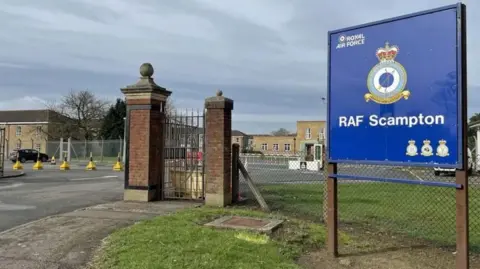 PA Media
PA MediaTimeline of key events
24 July 2018: The Ministry of Defence confirms Scampton, the home of the Red Arrows, is to be sold off
5 September 2022: RAF Scampton closes, with a service including a flypast from a Lancaster bomber
29 March 2023: Home Office confirms plans to use RAF Scampton to house asylum seekers, alongside bases in Essex and East Sussex
14 July 2023: Permission is granted for a judicial review following West Lindsey District Council's appearance at the High Court
22 September 2023: West Lindsey District Council issues 28-day Stop Notice to the Home Office
6 December 2023: Judge Mrs Justice Thornton dismisses claims in the judicial review and says plans are lawful
18 March 2024: Home Office confirms the number of asylum seekers housed at the base will be capped at 800
28 May 2024: An agreement is reached between West Lindsey District Council and the Home Office
1 August 2024: West Lindsey District Council asks Home Secretary to provide an update on the plans
5 September 2024: Home Office confirms it has scrapped the plan because it does not represent value for money
Listen to highlights from Lincolnshire on BBC Sounds, watch the latest episode of Look North or tell us about a story you think we should be covering here.
